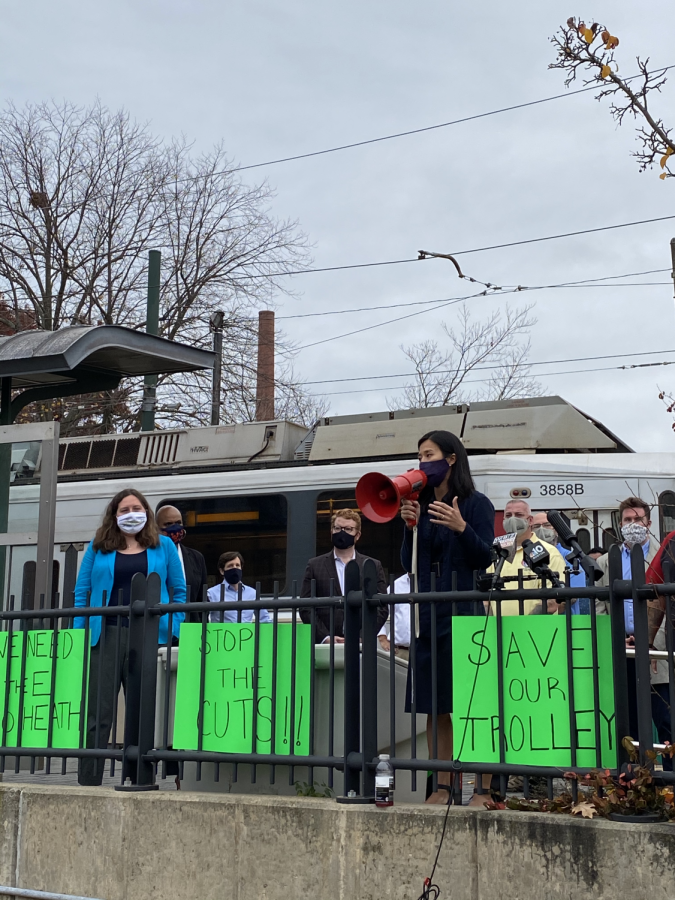Officials, residents, transit riders protest MBTA service cuts
Boston City Councilor Michelle Wu speaks to protestors rallying against the MBTA service cuts that were proposed Nov. 9.
November 24, 2020
On Nov. 11, local elected officials, Mission Hill and Jamaica Plain residents, among others, gathered at the Heath Street station in front of Jamaica Plain VA Medical Center to rally against the MBTA service cuts that were proposed Nov. 9.
The service cut on the Green E Line would eliminate stops from Brigham Circle to Heath Street, leaving transit riders to take alternate routes via other forms of public transportation, such as the 39 bus. The cut comes as a result of a budget deficit due to the impact of COVID-19, where MBTA has seen a significantly lower ridership, according to a video by Steve Poftak, the MBTA’s general manager.
Figures including City Councilor Kenzie Bok, Councilor Matt O’Malley, Sen. Sonia Chang-Diaz and President of Board at the North American Indian Center of Boston Jean-Luc Pierite spoke at the protest and highlighted the long-lasting impact it would have on the local communities.
“The service cut is nothing less than a death spiral. We have seen the stories of communities in Boston that have lost their T,” Bok said. “The state does not support [the MBTA] like a public resource. If they did, we would not be here right now.”
While addressing the audience, Bok recalled her time taking the Green E Line to visit her grandfather, who was a veteran, at the nursing and rehabilitation center Sherrill House, just up the road from the Heath Street station.
The service cut of the Green E Line impacts essential workers and veterans who use public transit to get to the VA Medical Center, residents of Jamaica Plain and Mission Hill, as well as seniors being treated at Sherrill House.
“We stand against these cuts in defense of the veterans, essential workers, low-income seniors, people with disabilities, and residents who use this important public transit line,” Bok said in a media advisory emailed to the News Nov. 10.
Despite the ridership dropping more than 80% in March and recovering slowly, public transit has continued to run the same levels of services as they did during normal ridership. In a letter to MBTA riders, Poftak wrote that these temporary service cuts were necessary in order to provide more responsible use of public transit.
Neighborhoods in Boston have seen a variety of services taken away from them after a revenue cut and were told they would be reversed but are hardly ever restored. Speakers mentioned examples, including the library in Chinatown that was restored in 2018, 62 years after it was removed to make space for the building of Mass Pike. And transportation, in particular, plays a crucial role in serving these communities.
“We have been here before, trying to convince the political establishment that public transit is important,” Ralph Walton, a retired member of Local 589 said. “Transportation is essential to dense communities like this area and the one up this hill.”
Boston City Councilor Michelle Wu, who has been advocating for free public transportation and has heavily criticized the fare hikes of the MBTA, also spoke at the rally.
“This is a dangerous move that would crowd people together, with less service, less action during a pandemic when we most need some space apart,” she said. “It is unacceptable that we are having to rally yet again for a shameless move by the Baker administration to privatize our public resource. We have come together one too many times.”
To close the rally, Rep. Ayanna Pressley spoke to the audience, linking the service cuts to the inequality and injustice that has been exacerbated by the COVID-19 pandemic.
“Transit justice is a racial justice issue, a worker’s rights, an economic justice issue, a health justice issue, a climate justice issue — this is a matter of justice worth fighting for.” Pressley said. “I want to say to our essential workers: We do not only honor and celebrate your labor. Yes, your work is essential, but so the hell is your lives.”
Several of the protestors that came out to the rally were local residents who are reliant on the Heath Street station to access the city center of Boston.
“I take the T at least once a week so [this service cut] means I would have to take the 39 bus and if you wanted to go downtown, you would have to switch to the T,” said Chestiene Curtiss, resident of Mission Hill. “It’s just really not a substitute for the Green Line.”
The trolley of Green E Line, which starts from Heath Street station, connects residents from Mission Hill and Jamaica Plain, medical workers and college students all the way to the center of the city.
“I enjoy driving [the Green Line] because I see a lot of students, workers, elderly that use this line frequently,” said Lisa Medeiros, a Green Line driver at the rally. “And I see that a lot of the ridership, especially down [Huntington Avenue], rely on the Green Line to get places. So, we really need to not cut services.”
The service cuts not only focus on the Green E Line but also aim to reduce lines in other areas around Boston as well. Most notable changes included all train lines operating until midnight instead of 1 a.m., a reduction of frequency of both trains and buses, as well as the ending of ferry services and weekend commuter rail services.
These changes are expected to go into effect at the earliest in January 2021 for the ferry and commuter rail, followed by trains and buses in the spring or summer. However, the MBTA states they are temporary reductions and are expected to return in the near future.
“Recent data projects ridership returning to pre-COVID levels starting in 2024,” Poftak said in his letter. “As riders return, we will review and adjust service to align with demand.”







